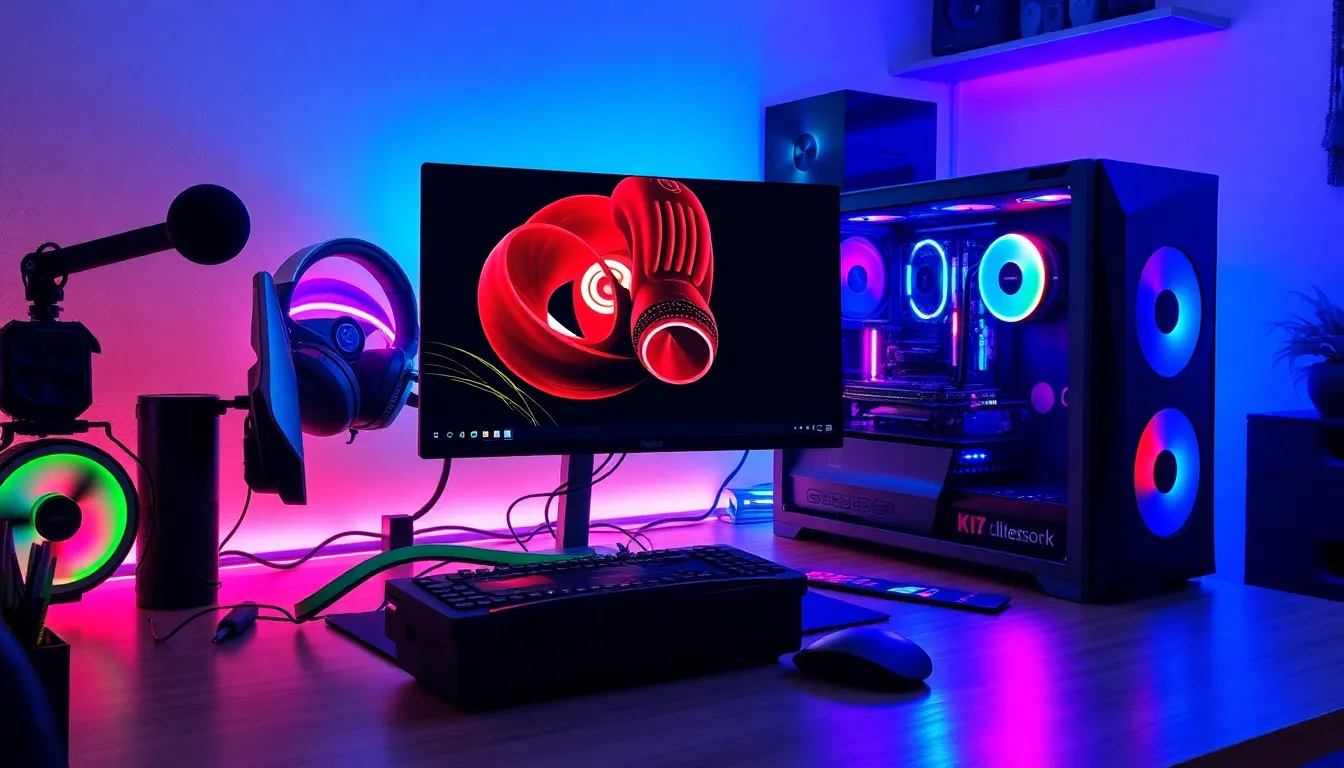In the fast-paced world of gaming, having a powerful PC can mean the difference between glory and defeat. But how can players tell if their setup is ready to conquer the latest titles? Enter gaming PC benchmarks—the ultimate scorecard for performance. Think of benchmarks as the gym test for your rig, revealing whether it’s ready to flex its muscles or needs a little more time in the virtual weight room.
With a plethora of hardware options and game requirements, navigating the gaming landscape can feel like trying to find a needle in a haystack. Fear not! Understanding benchmarks not only helps gamers make informed decisions but also ensures they’re not stuck in the pixelated past while their friends are leveling up. So buckle up! It’s time to dive into the world of gaming PC benchmarks and discover what makes a machine truly legendary.
Table of Contents
ToggleUnderstanding Gaming PC Benchmarks
Gaming PC benchmarks measure performance and help determine a system’s capability in running the latest titles. Exploring these benchmarks allows gamers to make informed choices about their setups.
Importance of Benchmarks
Benchmarks provide essential insights into a PC’s gaming performance. They reveal how well hardware performs under various conditions, offering a clear picture of a system’s strengths and weaknesses. Gamers rely on these measurements to compare different setups, ensuring they invest in components that meet their gaming needs. Tracking benchmark scores can also indicate when an upgrade is necessary, enhancing overall gaming experiences. Understanding benchmarks thus becomes vital for making competitive gaming decisions and optimizing setups.
Types of Benchmarks
Different types of benchmarks serve specific purposes in evaluating gaming performance. Synthetic benchmarks simulate real-world gaming scenarios and stress-test hardware capabilities. Game-specific benchmarks assess performance in particular titles, reflecting actual gameplay experiences. Frame rate benchmarks measure how many frames per second a system can handle, impacting smoothness during gameplay. Additionally, stress tests evaluate system stability under heavy loads, ensuring reliability during intense gaming sessions. Familiarity with these benchmark types enables gamers to assess their systems thoroughly and efficiently.
Popular Gaming Benchmarks

Gaming benchmarks help determine system performance and enable gamers to understand capabilities. Several types exemplify how effectively a gaming PC can run titles.
Synthetic Benchmarks
Synthetic benchmarks simulate gaming scenarios to assess performance metrics. They serve as controlled tests that provide a standard baseline for evaluating hardware. Using tools such as 3DMark or PCMark, gamers can evaluate graphics cards and processors in specific situations. Scores from synthetic benchmarks help compare different components before making a decision. This approach allows users to optimize their system for specific gaming needs.
Real-World Benchmarks
Real-world benchmarks measure performance during actual gameplay. These assessments often focus on specific titles, revealing frame rates and responsiveness in diverse settings. Popular games like Cyberpunk 2077 or Call of Duty: Warzone offer insights into how well different setups perform. Custom tests let users capture performance data under various conditions. Results from real-world benchmarks provide clear information on how a gaming PC handles real experiences.
Factors Affecting Gaming PC Performance
Several factors influence gaming PC performance, significantly impacting how well a system runs games. Understanding these components is vital for gamers looking to optimize their experience.
Hardware Specifications
Hardware specifications play a crucial role in determining a gaming PC’s performance. Processor speed and core count influence gaming experience by handling game calculations. Graphics card capabilities directly affect frame rates and visual quality during gameplay. RAM capacity and speed determine how many applications run simultaneously. Storage type, whether solid-state drives or hard disk drives, impact load times and overall responsiveness. Each component interacts, creating a balanced system that’s essential for smooth gaming.
Software Optimization
Software optimization enhances a gaming PC’s performance by ensuring all components operate efficiently. Operating system updates can improve compatibility with newer games, while driver updates for graphics cards ensure optimal performance. Background applications use significant resources, so closing unnecessary ones frees up memory and CPU power. Game settings also require adjustments to achieve the best performance-to-quality ratio. Optimizing game files through defragmentation or using game management software can reduce load times and improve responsiveness.
How to Interpret Benchmark Results
Understanding benchmark results is essential for gamers aiming to evaluate their PCs. Analyzing these metrics reveals vital information about performance capabilities.
Frame Rates and Resolution
Frame rates significantly impact gaming experiences. Higher frame rates, measured in frames per second (FPS), ensure smoother gameplay. A target of 60 FPS or more is common for high-quality gaming. Resolution also plays a crucial role, with options ranging from 1080p to 4K. Each resolution demands varying levels of graphics processing power. For example, a graphics card that maintains 60 FPS at 1080p may struggle at 4K. These metrics guide gamers in selecting configurations suited for their preferences and hardware capabilities.
CPU vs. GPU Performance
CPU and GPU performance benchmarks offer insights into critical components. A powerful CPU enhances game physics processing, AI calculations, and overall system responsiveness. In contrast, the GPU primarily handles rendering graphics. Benchmark scores for both parts should align with gaming requirements. Gamers often notice differences in performance during graphics-intensive tasks. It’s common for GPUs to take precedence in gaming-focused builds, but a balanced system ensures optimal performance. Understanding these dynamics aids gamers in selecting the right components based on their gaming preferences and desired performance levels.
Gaming PC benchmarks are essential tools for any serious gamer. They offer valuable insights into a system’s performance and help in making informed decisions about upgrades and component choices. By understanding both synthetic and real-world benchmarks, gamers can effectively evaluate their setups and optimize for the best gaming experience.
The interplay of hardware specifications and software optimization plays a pivotal role in achieving peak performance. Recognizing the importance of frame rates and the distinction between CPU and GPU benchmarks further empowers gamers to tailor their systems to their specific needs. Armed with this knowledge, they can ensure their gaming PCs remain competitive and capable of handling the latest titles with ease.


